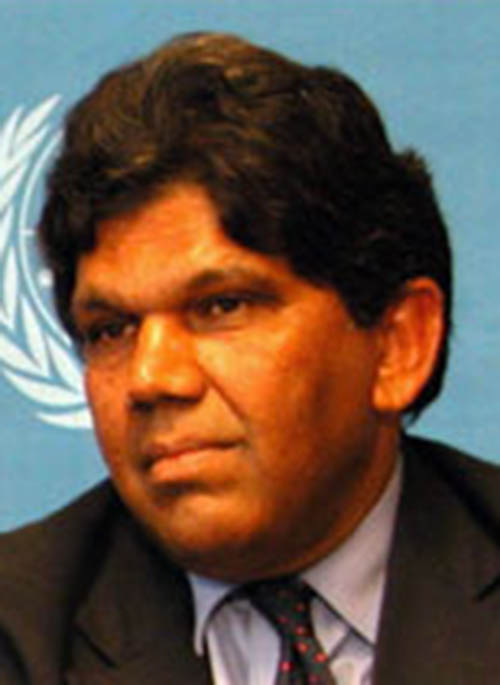Seventh Chancellor of the University of Guyana
Peoples’ perceptions count in politics. The news columns and letters in the Guyanese media bring out varying perceptions. Might one turn some of these perceptions to positive use for the future of the country? Yes we can: by assembling a volume of historical diagnoses of Guyana and drawing recommendations from them.
Some years ago, civil society in Guyana brought in this author as part of an international team to discuss with the various political, cultural, and other formations their perceptions of the way forward for the future of a multi-ethnic country. Four things stood out: Afro-Guyanese would not accept what they saw as Indo-Guyanese rule because of their electoral strength; Indo-Guyanese had strong resentments over what they saw as the twenty-eight years of PNC arbitrary and discriminatory rule; Indigenous representatives felt that they were marginalised; and people of mixed race were full of hope but not politically organized.
The way forward requires intellectual and policy leadership. The first four Presidents of Guyana had such intellectual depth. We knew Forbes Burnham well as a Barrister and he did have ideas, even if he might have gone off the rails. We also knew Desmond Hoyte and visited him in his home in North Road. He was fond of reading French literature. He certainly had ideas. Dr Cheddi Jagan and Mrs Janet Jagan, both of whom we knew well, were deep thinkers who pioneered the political path in Guyana.
Dr. Cheddi Jagan, with whom we spent much time in discussions when he visited the United Nations, had a historical diagnosis of the roots of the racial phenomenon in Guyana. In The West on Trial he analysed that the early division of labour occupationally and geographically according to race tended to prevent integration and to arouse racial hostility. He wrote:
“Undercutting of wages of the emancipated Africans by cheap Indian immigrant workers was the source of early conflict. So was the division of plantation labour into ‘field’ and ‘factory’. The Indians, the ‘field slaves’, were the least favoured and lowest paid; the Africans, the ‘house slaves’, who provided the factory labour and the domestic retinue were more favoured and better paid. The ‘mixed’ races were the best treated and the best paid, and constituted the bulk of the emerging middle class.”
The political struggles in Guyana since 1953, until now, and foreign manipulations during the cold war, prevented Guyanese leaders from benefitting from historical diagnoses of the Guyanese problematique that might have helped the country to move forward in a spirit of trust and confidence-building. Even now, when the electoral pendulum swings occasionally, political leadership has remained largely mired in small-mindedness. Forbes Burnham used to say, “In Guyana, the small man is the real man.” This adage fits admirably the political leadership the country has seen for some time. Historical diagnosis is crucial for taking Guyana forward. This is a country in which African slaves and Indentured Indians, Chinese and Portuguese were thrown together haphazardly in a land originally belonging to its indigenous peoples. Over time, people of mixed race became part of this mix. One should not under-estimate the challenges of nation-building in such an ethnic mix. This requires thoughtful historical analysis. For three and a half years we were part of the team of mediators during the fierce wars in the former Yugoslavia. That was a situation in which Ottoman occupation over five hundred years had added to the population of Serbs, Croats, Albanians and others, a group of converts, Muslims now known as Bosniacs. After the death of Tito the Yugoslav glue suddenly melted and they had no time to come to terms with their diversity. They had no time for historical analysis of their predicament. They fought bitterly as a result.
In the midst of the civil war in Ivory Coast, we led a UN mission to look at the situation first hand. Colonialism had thrown different ethnicities together. Tribes in the North felt disrespected by tribes of the South around the capital, Abidjan. To this day, the country has not yet arrived at an ethnic understanding. Cyprus, Myanmar and other countries demonstrate the pressing need for historical diagnoses of their situations and for the negotiation of ways forward.
Guyana urgently needs historical study and analysis of its ethnic predicament. Blithe pronouncements by pseudo leaders, of whatever ethnic complexion, will not help the country deal with its central problem, described by one Guyanese as “two nations living under one roof.” He should have said ‘four nations’.
The Guyanese Diaspora, especially historians, might be able to help provide historical diagnoses of Guyana’s ethnic predicament. Two Afro- and Indo-Guyanese historians might together edit a collection of essays under the rubric, Historical Diagnoses of Guyana’s Predicament. Chapters could be written by detached Guyanese historians on Afro-Guyanese perspectives; Indo-Guyanese perspectives; Indigenous-Guyanese perspectives; Chinese and Portuguese perspectives; and the perspectives of people of mixed ethnicity. We emphasise: written by detached historians.
Perhaps friends of Guyana might help fund such a project. If it is well done, it could provide invaluable insights and lead to recommendations on ways forward for nation-building in the Dear Land.
Let us say up front that we are content to put forward this idea but do not envisage being involved in its implementation. We were admitted to practice at the Bar of Guyana in 1969 and then left to join the United Nations, where we served for four decades. We were honoured to serve as the Chancellor of the University of Guyana. We declined offers to become Guyana’s Ambassador to the UN in 1977; to join Dr Jagan’s team in 1992; and to become Attorney-General in the mid 1990s. We have served the world, but our heart remains in Guyana.
We must study the history of our nation if we are to help it. The achievement of One People, One Nation, One Destiny, requires conscious effort. Historical Diagnoses of Guyana’s Predicament can help in this effort.










